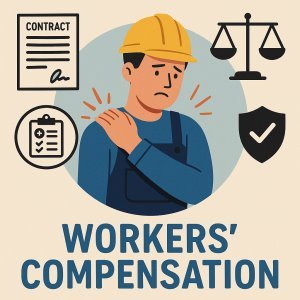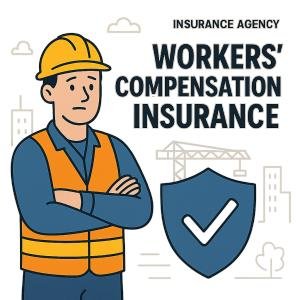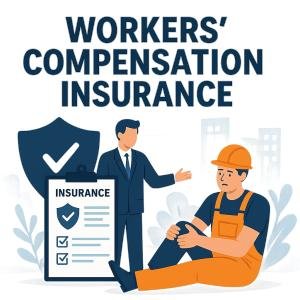
Forklift Telemetry: Data to Reduce Workers Comp Claims
August 6, 2025
Unlock Safety Credits: Lower Your Georgia Security Guard Workers’ Comp Premiums
August 6, 2025In teh security industry,ensuring the safety and protection of your workforce is paramount-not only on the job but also through thorough risk management strategies. For security guard companies, one critical component of this strategy is obtaining workers’ compensation insurance. This specialized coverage safeguards your business against the financial repercussions of workplace injuries and illnesses, providing both your employees and your company with essential protection. Navigating the complexities of workers’ comp insurance can be challenging, especially given the unique risks associated with security services. This article will guide you through the key considerations and practical steps involved in purchasing the right workers’ compensation insurance tailored to your security guard company’s specific needs.
Table of Contents
- Understanding Workers’ Compensation Requirements for Security Guard Companies
- Evaluating Insurance Providers Specializing in Security Industry Coverage
- assessing Risk Factors to Determine Appropriate Coverage Levels
- Implementing Best Practices for Claims Management and Policy Maintenance
- Q&A
- Concluding Remarks
Understanding Workers’ Compensation Requirements for Security guard Companies
Security guard companies operate in an industry marked by physical risks and liabilities, making workers’ compensation insurance not just a legal obligation but a crucial component of risk management. Before purchasing a policy, it’s essential to understand state-specific mandates and the classification codes assigned to security personnel, which directly influence premiums. Additionally,companies must evaluate the scope of coverage options available,including medical benefits,disability payments,and rehabilitation costs,ensuring they align with the unique exposures security guards face during their duties.
When determining coverage needs, consider the following key factors:
- Employee Classification: Differentiating between armed, unarmed, and supervisory roles can affect rates and coverage limits.
- Payroll Size: Workers’ comp premiums are typically calculated based on total payroll, so accurate reporting is vital.
- Safety Programs: Strong workplace safety protocols can reduce claims and possibly lower insurance costs.
- Claim History: A clean claims record reflects well on risk profiles and can result in preferential rates.
| Security Role | Typical Workers’ Comp Classification Code | risk Level |
|---|---|---|
| Unarmed Security Guard | 7380 | medium |
| Armed Security Guard | 7383 | High |
| Security Supervisor | 7388 | Medium |
Evaluating Insurance Providers specializing in Security Industry Coverage
Choosing an insurance provider with expertise in the security sector demands thorough research and a keen understanding of industry-specific risks. Evaluate each provider’s experience in handling claims uniquely related to security personnel, such as assault or on-the-job violence, which are common yet complex in this line of work. Look for insurers offering tailored coverage packages that include risk assessment services, safety training programs, and rapid claim processing to minimize business disruptions.
Several key factors help differentiate specialist insurance providers from general ones. Consider these criteria when reviewing potential partners:
- Claims Handling Efficiency: Speed and fairness in claim settlements.
- Customized Policy Options: Flexibility in coverage limits and endorsements.
- Industry Reputation: Verified feedback from other security companies.
- Regulatory Compliance support: Assistance with local and federal insurance mandates.
| Provider | Special Features | Claim Turnaround |
|---|---|---|
| SecureGuard Insurance | Risk Management Consultation | 48-72 hours |
| ShieldComp Solutions | Online Claim Tracking | 24-48 hours |
| Protector Insurers | Customized Legal Defense coverage | 72 hours |
Assessing Risk Factors to Determine Appropriate Coverage Levels
before choosing a workers’ compensation insurance plan for your security guard company, it’s essential to conduct a thorough evaluation of internal and external factors that could impact your coverage needs. Consider the number of employees on your payroll, the level of risk inherent in their specific duties, and the geographic locations where they operate. Guards assigned to high-risk environments such as event security or construction sites typically require higher coverage limits than those in less hazardous settings.Additionally, pay close attention to your company’s ancient claims data, as frequent or severe injuries may signal the need for broader protection.
Key elements to assess include:
- Employee roles and their exposure to hazards
- Company size and anticipated growth trajectory
- State-specific workers’ comp regulations and minimum coverage mandates
- Frequency and severity of past workers’ compensation claims
| risk Factor | Impact on Coverage | Recommended Coverage Adjustment |
|---|---|---|
| High-Risk Work Assignments | Increased likelihood of injury | Higher coverage limits |
| Company Growth | More employees increase exposure | Adjust coverage periodically |
| Past Claims History | Indicates potential risk trends | Consider enhanced policies or risk management |
Implementing Best Practices for claims Management and Policy Maintenance
Efficient claims management is essential for minimizing the financial impact and operational disruption caused by workplace injuries. Start by establishing a clear, documented process that ensures claims are reported promptly and accurately. Train your supervisors and employees on the importance of timely reporting and the steps involved. Maintaining consistent communication with your insurance provider helps expedite the claims process and avoid needless delays or denials. Additionally, leveraging claims management software tailored to your security company’s needs can streamline workflows and create a centralized repository for documentation and correspondence.
Policy maintenance requires ongoing vigilance to ensure coverage remains aligned with your evolving business risks. Regularly review your policy to account for changes such as staff increases,shifts in job roles,or new operational procedures.Collaborate with your insurance agent to analyze premium adjustments or alternative coverage options that might better suit your financial goals without compromising protection. Consider establishing a quarterly or biannual review cycle that includes:
- Audit of employee classifications and payroll reports
- Assessment of workplace safety protocols
- Verification of claims history trends
- Evaluation of insurer responsiveness and service quality
| Best Practice | Benefit | action Step |
|---|---|---|
| Prompt Reporting | Improves claim resolution time | Train staff on immediate injury reporting |
| Regular Policy Reviews | Keeps coverage aligned with risks | Schedule biannual policy assessments |
| Claims Documentation | Prevents errors and denials | Use digital tools for record keeping |
Q&A
Q&A: How to buy Workers’ Comp Insurance for your Security Guard Company
Q1: What is workers’ comp insurance and why is it critically importent for a security guard company?
A: Workers’ compensation insurance provides coverage for medical expenses, lost wages, and rehabilitation costs if an employee is injured or becomes ill due to work-related activities. For security guard companies, which ofen have physically demanding and potentially hazardous job duties, having workers’ comp insurance is critical for protecting both employees and the business from financial liabilities.
Q2: Is workers’ comp insurance legally required for security guard companies?
A: In most states, workers’ comp insurance is mandatory for businesses with employees, including security guard companies. Requirements vary by state, so it’s important to check local legislation to ensure compliance and avoid fines or legal penalties.Q3: How do I determine the right amount of coverage for my security guard business?
A: the ideal coverage depends on factors like the number of employees, the type of security services offered, state laws, and historical workplace injury rates. Consulting with an insurance broker or agent specializing in workers’ comp for security firms can help you assess your risk profile and obtain a policy that adequately covers potential claims.
Q4: What data will an insurance provider need to quote a workers’ comp policy?
A: Providers typically require details such as the number of employees, payroll figures, job descriptions, safety protocols, and the company’s claim history. Accurate information ensures an appropriate premium calculation and reduces the risk of coverage gaps.
Q5: Can security guard companies reduce their workers’ comp premiums?
A: Yes. Implementing strong safety programs, providing employee training, maintaining workplace compliance, and having a low claims history can all help lower premiums. Some insurers also offer discounts for risk management initiatives and regular safety audits.
Q6: Should I buy workers’ comp insurance through a broker or directly from an insurance company?
A: Both options are valid. A broker can provide access to multiple carriers and help tailor coverage to your needs, while purchasing directly may be simpler but less flexible. For specialized coverage like workers’ comp in security, a knowledgeable broker is often beneficial.
Q7: What steps should I follow to buy workers’ comp insurance for my security guard company?
A:
- Assess your company’s workforce and workplace risks.
- Research state-specific requirements.
- Gather necessary business and payroll information.
- Contact multiple insurers or a specialized broker.
- Compare quotes and coverage terms.
- Choose a policy that aligns with your budget and risk management goals.
- Maintain ongoing communication with your insurer to update coverage as your business grows.
Q8: How frequently enough should workers’ comp insurance policies be reviewed or updated?
A: Policies should be reviewed annually or whenever critically important changes occur-such as hiring additional staff, expanding services, or modifying job roles-to ensure appropriate coverage and accurate premium payments.
This Q&A provides security guard company owners with clear, professional guidance on navigating the process of purchasing workers’ compensation insurance tailored to their industry.
Concluding Remarks
securing the right workers’ compensation insurance is a critical step in protecting your security guard company from financial risk and ensuring compliance with legal requirements. By carefully assessing your company’s specific needs, researching potential insurers, and understanding policy terms and coverage options, you can make an informed decision that safeguards both your employees and your business. Partnering with experienced insurance professionals can further streamline the process, providing valuable guidance and support. Ultimately, investing the time and resources to obtain appropriate workers’ comp coverage will contribute to the long-term stability and success of your security guard company.
“This content was generated with the assistance of artificial intelligence. While we strive for accuracy, AI-generated content may not always reflect the most current information or professional advice. Users are encouraged to independently verify critical information and, where appropriate, consult with qualified professionals, lawyers, state statutes and regulations & NCCI rules & manuals before making decisions based on this content.







